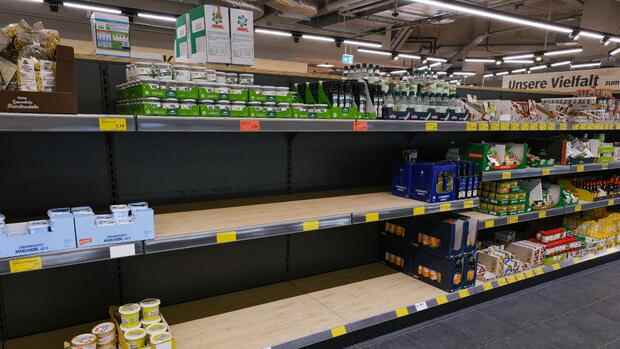Many foods are currently hardly available, others are becoming significantly more expensive.
(Photo: IMAGO/Michael Gstettenbauer)
Berlin According to estimates by the retail industry, food prices in Germany are likely to continue to rise significantly – and at Aldi this will be felt as early as Monday. Even before the outbreak of the Ukraine war, retail prices “across the product range” had risen by a good five percent, said Josef Sanktjohanser, President of the German Retail Association (HDE), the “Neue Osnabrücker Zeitung”. This was the result of increased energy costs. “The second wave of price increases is coming, and it will certainly be in the double digits,” said Sanktjohanser.
The first retail chains have already started to raise prices. “We will soon be able to see this on the price tags everywhere in the supermarkets.” “For the time being, there will be no more sustained downward movement in prices,” said Sanktjohanser. Retail chains such as Aldi, Edeka and Globus had recently announced price increases.
Aldi gets serious again on Monday: Meat, sausage and butter will then be “significantly more expensive”, as Aldi-Nord communications manager Florian Scholbeck told the dpa in Essen. The reason for this is the higher prices that Aldi has to pay its suppliers.
“Since the start of the Ukraine war, there have been jumps in purchase prices that we have never experienced before.” This is also due to the fact that feed, fertilizer and energy have become more expensive. This in turn would be felt by farmers in their livestock farming and the meat processing industry. The “Westdeutsche Allgemeine Zeitung” had previously reported on the price increases.
Top jobs of the day
Find the best jobs now and
be notified by email.
According to the newspaper, Aldi Süd also feels compelled to raise prices. The increases vary depending on the product.
>> Read also: These products are more expensive and scarce in the supermarket
Aldi had already increased the prices for around 160 items two weeks ago, and a week later another 20 items became more expensive. Competitors followed suit.
Due to the situation on the world markets, “increasing sales prices throughout the industry […] don’t always avoid it,” said Edeka last week, for example. According to a recently published survey by the Ifo Institute, almost all German food retail companies are planning price increases.
Farmer’s President Joachim Rukwied said that the food supply was secured for the foreseeable future for a year. “But beyond that time horizon, it’s difficult to forecast.”
At the level of the Central Coordination Trade – Agriculture (ZKHL), the leading trade and agricultural industry associations exchange views on the consequences of the Ukraine war. ZKHL Managing Director Hermann-Josef Nienhoff said the current wave of price increases has not yet reached consumers. The ZKHL was brought into being after persistent protests from the agricultural sector against the pricing policy of the trading groups.
More: Sales of edible oil and flour have risen sharply since the beginning of the war
